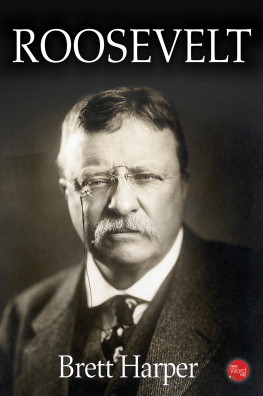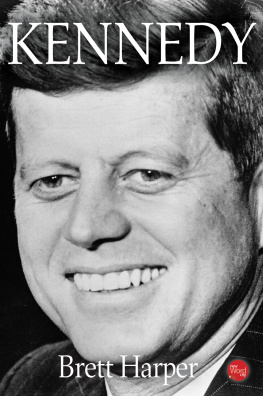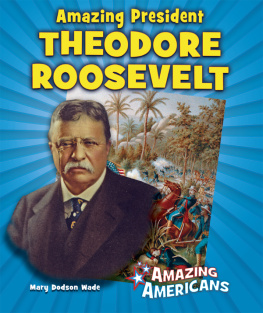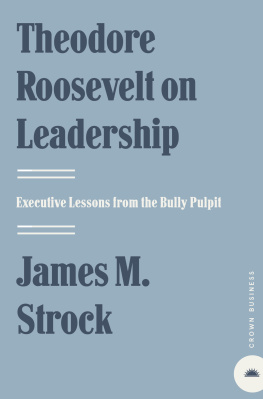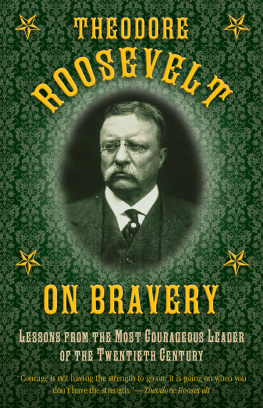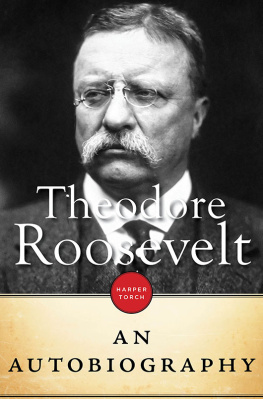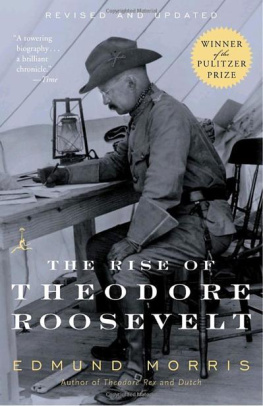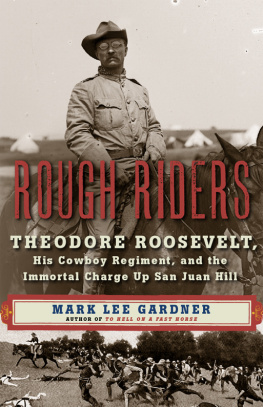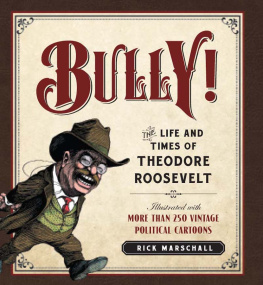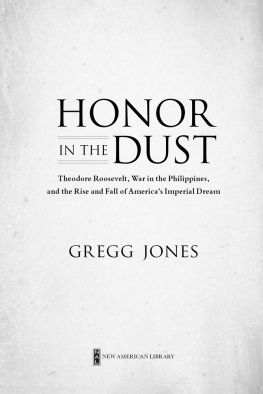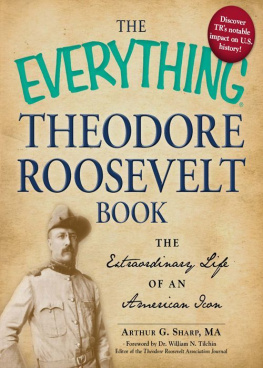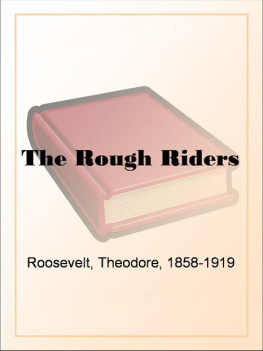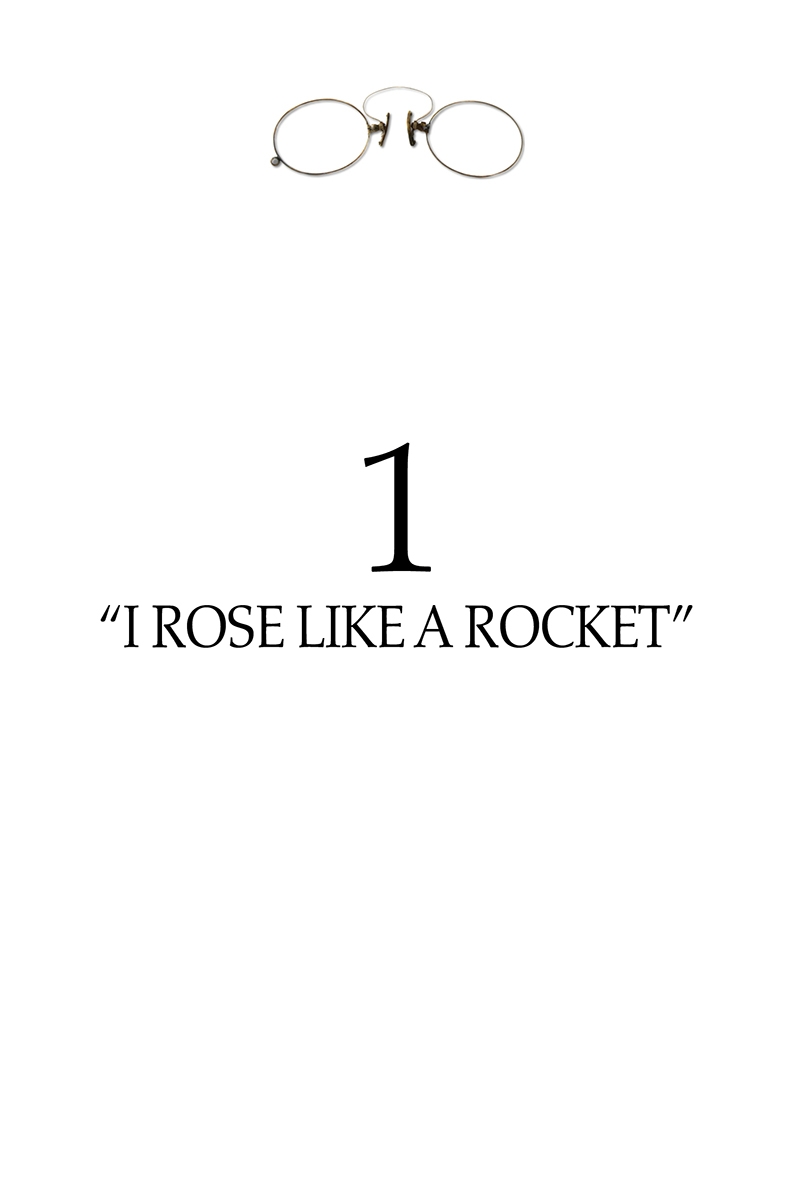Nearly a century after his death, President Theodore Roosevelt is still a vivid presence in America. He was a sickly boy who willed himself to become an outdoorsman and a warrior; a man of letters who remembered everything he read and wrote forty books of his own; a dedicated political reformer who understood that compromise is the key to progress; and a fighter who relished every battle, from leading his Rough Riders in the Battle of San Juan Hill in Cuba to facing down political bosses and busting malevolent trusts that threatened his country. And Roosevelt is widely regarded as one of Americas greatest presidents, whose spectacled face glares from Mount Rushmore in the exalted company of presidents Washington, Jefferson, and Lincoln.
But beneath that common impression lurks a complex man of contradictions and surprisingly flexible principles, who knew when to fight and when to walk away. He was universally known as Teddy, but he came to dislike the nickname, and few of his friends actually used it. He adored his first wife, but after her death, he never spoke her name. He promised a square deal for every American, rich or poor, and supported womens rights, but he never shook his belief that people of other races were incapable of governing themselves without white supervision.
Roosevelts image as one of Americas most straightforward political figures is nearly a caricature of virility, patriotism, devotion to family, and love of nature. More than anything else, what gleams through the dust of history is his zest for life and power; the one word most firmly linked to him is the archaic plaudit, Bully!
THEODORE ROOSEVELT WAS born on October 27, 1858, the second of four children, to one of the wealthiest men in New York City. His father, also Theodore , was a glass merchant and philanthropist who spent his time and money improving the lives of New Yorks poorest residents, especially immigrants. Thee, as he was called, had married Martha Stewart Bulloch , nicknamed Mittie, who had grown up on a plantation in the village of Roswell, Georgia.
Theodore Junior, known as Teedie, was a sickly child, plagued from birth by numerous ailments, the worst of them asthma. When he couldnt sleep, gripped by an attack, gasping for breath, and terrified he would suffocate, his father would carry the boy from room to room or drive him in his horse and carriage through the city streets. My father, Roosevelt would write, he got me breath, he got me lungs, strength life. As Roosevelts sister Corinne would say, it was ironic that Theodore Roosevelt, whose name later became the synonym of virile health and vigor, was a fragile, patient sufferer in those early days of the nursery.
Teedies comfortable life in Manhattan with his siblings his older sister Anna , nicknamed Bamie, Elliott (who later became the father of Eleanor Roosevelt , who would marry another more distant cousin, President Franklin Delano Roosevelt .), and Corinne - was disrupted by the Civil War , which strained their parents otherwise loving marriage. Mitties sister Anna and widowed mother had left Georgia and moved in with Thee and Mittie, and the womens pro-Confederacy stance conflicted with Thees pro-Union sentiments. To avoid arguments, Mittie stayed away from the dinner table. Thee wanted to enlist in the Army, but Mittie argued that he would be fighting against her brothers, so he hired a substitute then a common practice, but an act he always regretted and one his son would feel honor-bound to redeem. Instead, Thee spent the war years working for the U.S. Sanitary Commission, the forerunner of the American Red Cross , helping sick and wounded soldiers, and the U.S. Employment Bureau, searching for work for soldiers who had lost limbs. He also was a charter member of the Union League, which raised money to support both causes. He worked hard at his business and other philanthropies and enjoyed a rich social life. Father was the finest man I ever knew and the happiest, Roosevelt wrote.
Mitties sister tutored the children at home, and Thee instilled in them an abiding love of learning by reading to them, organizing amateur dramas, and encouraging them to write, recite poetry, and pursue other intellectual interests. Teedie was a voracious reader and showed a talent for naturalism; in the familys summer house at Oyster Bay on Long Island, he watched birds, took lessons in taxidermy, and after obtaining a seals head at a local market with two cousins, set up at the age of seven his own Roosevelt Museum of Natural History. Corinnes friends Edith Carow and Fannie Smith were regular visitors, and Teedie, the ordained leader of the group, orchestrated their activities and made up stories to entertain the other children.
When Teedie was ten, Thee and Mittie took all the children on a year-long tour of England, France, Germany, Holland, Italy, Scotland, and Switzerland. Teedie kept a detailed diary of his experiences both physical and intellectual, from climbing Mount Vesuvius to viewing the treasures of the Vatican. Despite these adventures, Teedie spent much of the journey bedridden by asthma and stomach troubles. Back home, Thee took his son aside for a talk.
Theodore, he said, using the boys formal name to stress the gravity of what he was about to say, you have the mind but you have not the body, and without the help of the body, the mind cannot go as far as it should. You must make your body. It is hard drudgery to make ones body, but I know you will do it.
Teedie promised, Ill make my body. From then on, he followed a punishing routine of lifting weights and exercising. His father installed a home gym on the second floor of the townhouse, and Teedies determination kept him at the task daily, even though his progress was painfully slow. After two boys teased him into a fight and then whipped him with easy contempt, as he later wrote, Teedie started taking boxing lessons. Although timid by nature, by acting as if I was not afraid, I gradually ceased to be afraid. Courage was a matter of habit and willpower, he decided, and he cultivated it for the rest of his life. It was years before the boxing lessons and the workouts produced visible results, but his health improved; the asthma attacks still came, but rarely. In the month of August 1871, his diary didnt mention a single ailment. It would be many years before the asthma and intestinal inflammation completely ended, but Roosevelt had conquered his body and he would do so again and again.
When Theodore was fourteen, Thee once more took the family abroad, this time spending a year in Egypt, Germany, Greece, Palestine, Syria, and Turkey. The boy reveled in the exotic and historic sights and scenes, writing in his diary: In the evening, we visited Harnak [sic] by moonlight. It was not beautiful only, it was grand, magnificent, and awe-inspiring. It seemed to take me back thousands of years, to the time of the Pharohs [sic] and to inspire thoughts which can never be spoken, a glimpse of the ineffable, of the unutterable. He observed, shot, and stuffed dozens of birds and animals, his vision and aim improved by eyeglasses. I had no idea how beautiful the world was, he wrote later, until I got those spectacles.
The family returned home to a new mansion on West 57th Street, with a full gym and attic space for Theodores specimens. At fifteen, his education was too spotty to qualify him for admission to Harvard, so Thee hired a tutor, Arthur Cutler. Cutler was impressed with the alert, vigorous character of young Roosevelts mind, writing later, The young man never seemed to know what idleness was. His disciplined work took him through three years of college preparation in twenty-four months. He was a hard act for his younger brother Elliott to follow. Oh, Father will you ever think me a noble boy, Elliott once wrote from school. You are right about Teedie. He is one, and no mistake a boy I would give a good deal to be like. He promised to try to be as good... but it is hard.

